More Articles
- What Can I Use as an Egg Substitute When Baking Corn Bread?
- What Can I Use as an Egg Substitute When Baking Cornbread?
- What Can You Use in Place of Egg Yolk as a Binder in Cooking & Baking?
- What Happens When You Forget to Put Eggs in the Brownie Batter?
- How to Replace Eggs With Applesauce, Banana and Bread
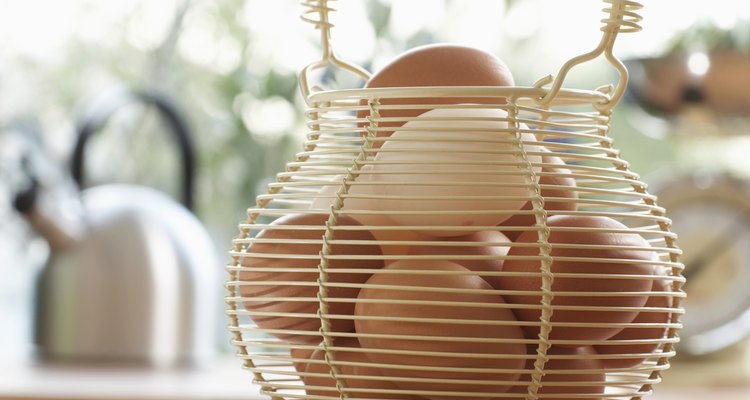
Martin Poole/Digital Vision/Getty Images
For anyone who bakes regularly, making substitutions for baking recipes is a normal – if occasionally tricky – part of life. Some ingredients are relatively straightforward to exchange for each other, but finding an egg substitute can be difficult. If you're reducing fat and cholesterol, baking for people with an egg allergy or vegan family member, or just plain out of eggs, applesauce is one potential substitute to get a similar final product without changing the original recipe too much.
What Eggs Do
Eggs are hard to replace, because they play so many roles in baking. Much of an egg's volume consists of water, so they account for a good portion of your recipe's liquid. Emulsifiers in the eggs help those liquids combine with the fat and other ingredients. Bakers count on eggs to trap some of the air that acts as a leavening agent and leavens and lightens the finished product. Sometimes that lift comes from whipping the egg whites; other times it's because their proteins, along with proteins in the flour, help trap expanding gasses from the baking powder or baking soda. Eggs also help enrich and soften the crumb of baked goods, like brownies, quick breads, chocolate chip cookies, or cupcakes. It's difficult for any one substitute to adequately do all of those things.
The Best Egg Substitute: Applesauce
Unsweetened applesauce can be one of the easiest substitutes, because it's inexpensive and available even in the most remote areas. A whole egg is about 1/4 cup by volume, and 1/4 cup of applesauce makes a suitable substitute for that single egg in most baked goods. Half a cup of applesauce can also replace two eggs in many recipes -- though the differences in texture will become more obvious. If your recipe calls for three eggs or more, applesauce and most other substitutes become problematic. Recipes containing that much egg usually rely on the eggs to provide much of their structure, and applesauce has no comparable proteins.
Adjustments
Applesauce isn't a direct replacement for eggs, so you might find that a few further adjustments can improve the finished results in your baking. If you find that your egg-free batter doesn't mix well, giving finished cakes and muffins an inconsistent and coarse texture, it needs some help during mixing. Some grocery stores and most bulk food stores sell lecithin in liquid or granule form, and this emulsifier acts like egg yolks to help your other ingredients mix. If your baked goods have a low, dense structure, add some extra baking powder to replace the lost leavening power of the eggs. If you find your baked goods unpleasantly chewy, add a small amount of extra fat to compensate for the lost richness of the egg yolks.
Other Substitutions to Use in Place of Eggs
If you have an allergy sufferer or vegan in the household, it's helpful to have a few other substitutions and techniques in your arsenal. Other purees, such as cooked pumpkin or mashed banana, work better in some recipes. Avocado puree is an especially good egg replacement, thanks to its high fat content. Aquafaba – the liquid found in a can of chickpeas – is a good substitute as well, and will whip up into peaks the same way egg whites do so you can make meringue. Soft silken tofu is another versatile substitute, serving as a main ingredient in many vegan baked goods. A tablespoon of ground flaxseed or chia seeds, soaked in 2 tablespoons of water, provides fiber, emulsifiers and a powerful gelling effect. You can buy xanthan gum, guar gum and similar thickeners in many bulk food stores, and these are used in some vegan recipes. They're also included in many commercial egg-replacement products.
Related Articles

What Can I Use as an Egg Substitute ...

What Can I Use as an Egg Substitute ...

What Can You Use in Place of Egg Yolk ...

What Happens When You Forget to Put ...
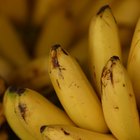
How to Replace Eggs With Applesauce, ...
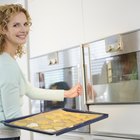
What Can Be Used Instead of Eggs for ...

Can You Make Scones With Coconut Flour?

Can I Make Boxed Devil's Food Cake Mix ...

What if You Forget to Put Eggs Into ...

Does Adding an Extra Egg to Brownie Mix ...

Applesauce as an Egg Substitute for ...

Whole Eggs Vs. Egg Yolks for Sweet Bread

I Forgot to Put the Egg in the Banana ...

What Is a Substitute for Potassium ...

Whole Wheat Pastry: Flour Substitutions
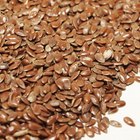
How to Bake With Flax Seed

What Can You Use in Place of Egg Yolk ...

The Differences in Baking with Jumbo & ...

Cream of Tartar Substitute for Egg ...
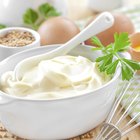
How to Replace Eggs With Mayonnaise
Writer Bio
Fred Decker is a trained chef and prolific freelance writer. In previous careers, he sold insurance and mutual funds, and was a longtime retailer. He was educated at Memorial University of Newfoundland and the Northern Alberta Institute of Technology. His articles have appeared on numerous home and garden sites including GoneOutdoors, TheNest and eHow.
Photo Credits
Martin Poole/Digital Vision/Getty Images